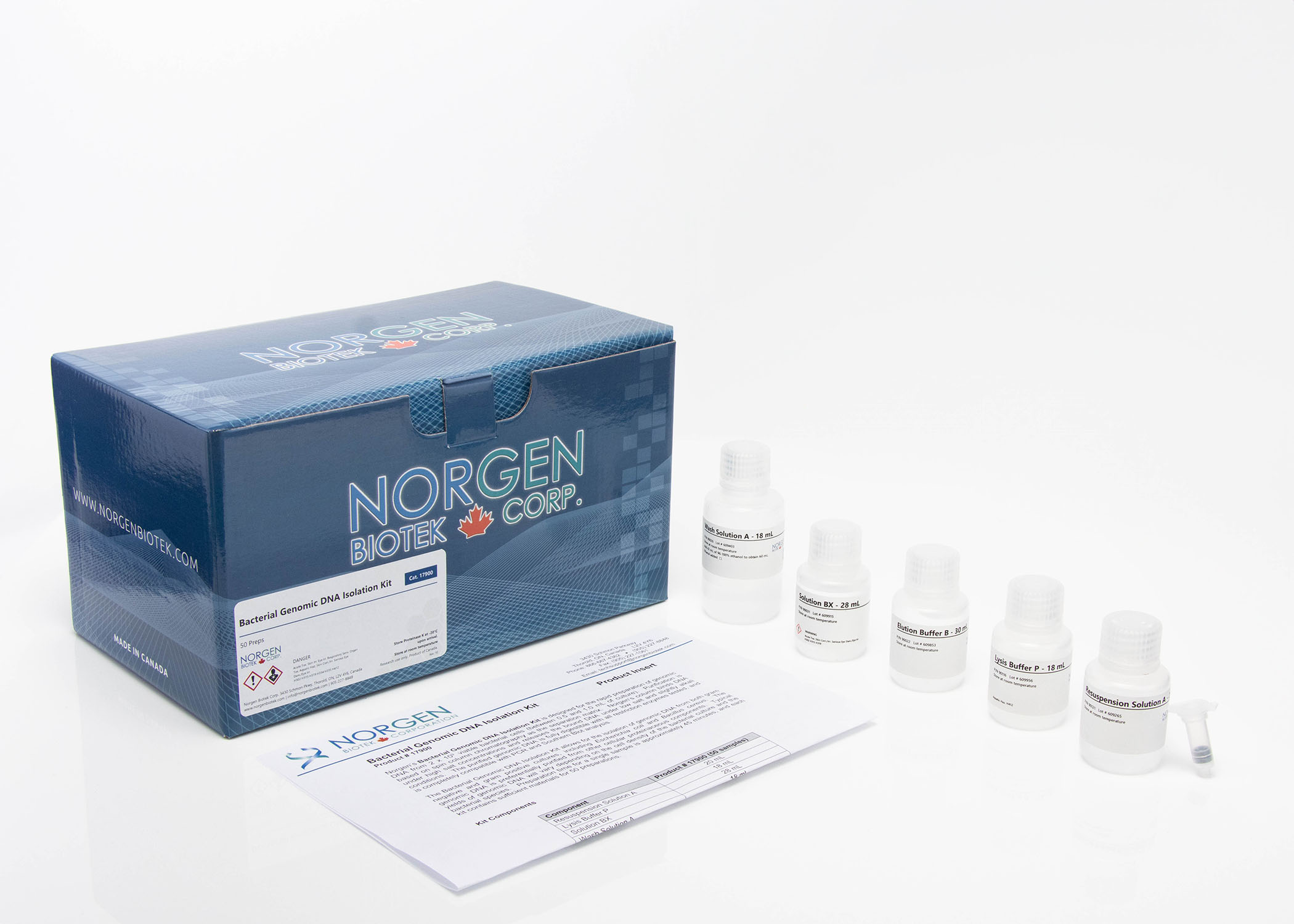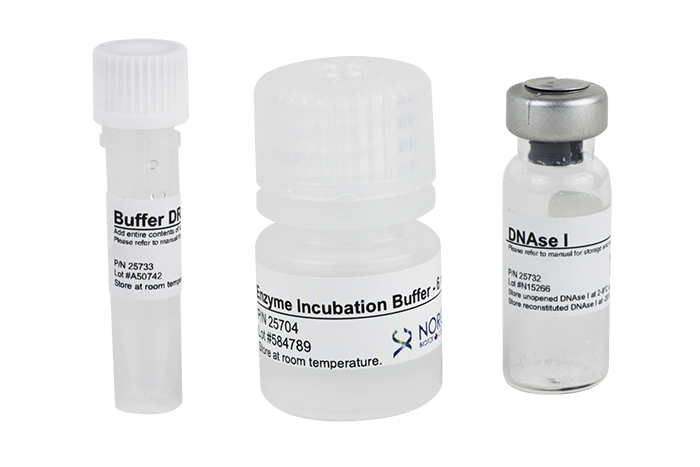Phage DNA Isolation Kit
For the rapid purification of total DNA from bacteriophages.
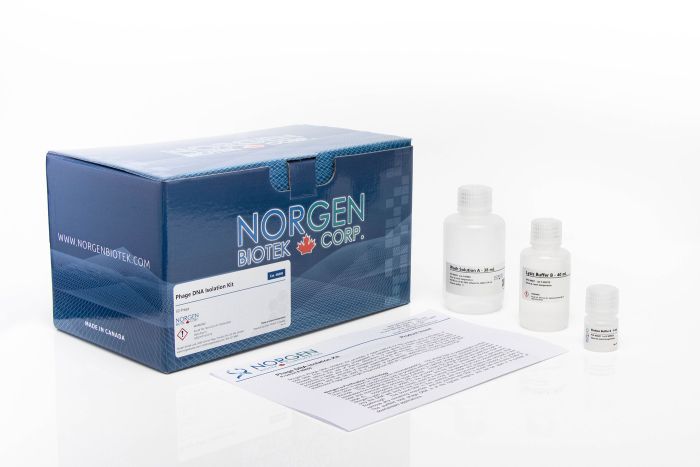
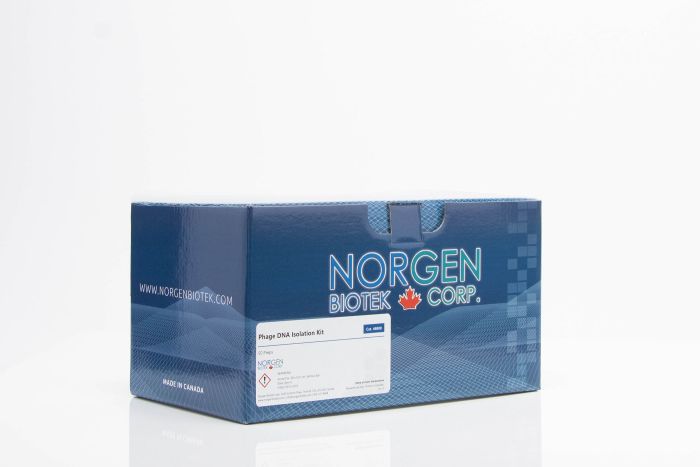
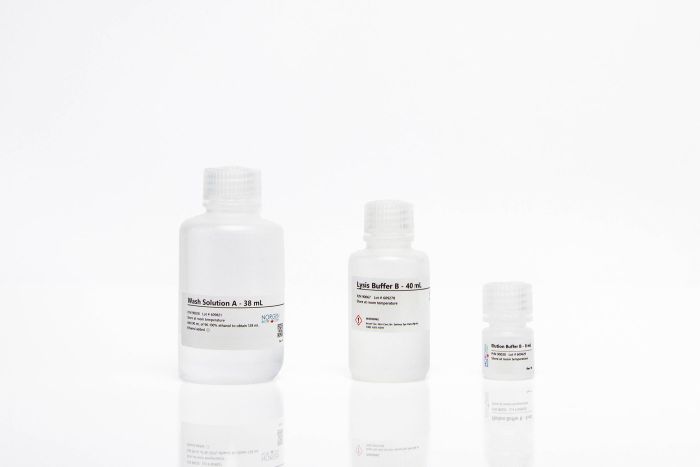
For research use only and NOT intended for in vitro diagnostics.
Phage DNA Isolation Kit
For the rapid purification of total DNA from bacteriophages.
Features and Benefits
- Isolate high quality DNA from a broad variety of phage strains
- High yields of total DNA
- Fast and easy processing using a rapid spin-column format
- No phenol or chloroform extractions or cesium chloride banding required
- High yields of DNA recovered 3-15 µg DNA from 108-1010 pfu/ mL of enriched phages
This kit provides a rapid spin column method for the purification of total DNA from a broad spectrum of bacteriophages propagated in bacteria grown in liquid cultures. The DNA is isolated without the use of phenol, chloroform or cesium chloride banding procedures. The spin-column based procedure is rapid and can be completed in less than 45 minutes. The kit is highly efficient for processing small volumes of phage supernatant (500 µL – 1 mL) and with the optional DNase and Proteinase K treatments phage DNA yields are maximized while host DNA contamination is minimized. Purified total phage DNA is of the highest integrity, and can be used in a number of downstream applications including PCR, qPCR, Restriction Fragment Length Polymorphism (RFLP), sequencing, cloning, Southern Blot and more.
Details
Supporting Data
Figure 1. Effective Host Genomic DNA Removal without Reducing Phage DNA Yield. Total DNA was isolated from four enriched phage cultures using Norgen's Phage DNA Isolation Kit. A DNase I pre-treatment was performed prior to adding the provided Lysis Buffer. Briefly, 20 units of DNase I was added to 1 mL of enriched phage culture and the mixture was incubated at room temperature for 20 minutes. After the DNAase I treatment the procedure was followed. As a control, DNA was isolated from aliquots of the same 4 cultures using Norgen’s Phage DNA Isolation Kit without performing the DNase I treatment. For DNA analysis 10 µL of each 50 µL elution was loaded onto a 1X TAE agarose gel. As it can be seen, the phage DNA was safely protected from the DNase I treatment by its coat protein, while the host genomic DNA was efficiently degraded by the DNase I. Thus the DNase I pre-treatment resulted in less host gDNA contamination in the final phage elution without influencing the total phage DNA yield. Lane M is Norgen's Highranger 1 kb DNA Ladder (Cat. 11900)
Figure 2. Optional Proteinase K Treatment Improves DNA Yield for Certain Phage Strains. Total DNA was isolated with and without the optional Proteinase K treatment using Norgen's Phage DNA Isolation Kit. Briefly, 4 µL of Proteinase K (20 mg/mL) was added to 1 mL of enriched phage culture and incubated at 55°C for 15 minutes with the phage Lysis Buffer. After the Proteinase K treatment the procedure was followed. As a control, DNA was isolated from aliquots of the same 8 cultures using Norgen's Phage DNA Isolation Kit without performing the Proteinase K treatment. For DNA analysis 10 µL of each 50 µL elution was loaded onto a 1X TAE agarose gel and the yield of DNA was compared from the eight different phage types (lane 1 to 8). As it can be seen, the optional treatment of Proteinase K improved the phage DNA yield in Lanes 2, 5 and 6 dramatically. Lane M is Norgen's Highranger 1 kb DNA Ladder (Cat. 11900)
|
Kit Specifications
|
|
|
Column Binding Capacity
|
50 µg
|
|
Maximum Column Loading Volume
|
650 µL
|
|
Size of DNA Purified
|
All sizes
|
| Maximum Amount of Starting Material |
1 x 1010 pfu/mL enriched phages
|
| Average Yield* |
3-15 µg DNA from 108-1010 pfu/mL
of enriched phages |
| Time to Complete 10 Purifications |
45 minutes
|
* Average yields will vary depending upon a number conditions used and developmental stage.
Storage Conditions and Product Stability
All solutions should be kept tightly sealed and stored at room temperature. This kit is stable for 1 year after the date of shipment.
| Component | Cat. 46800 (50 preps) | Cat. 46850 (100 preps) |
|---|---|---|
| Lysis Buffer B | 40 mL | 2 x 40 mL |
| Wash Solution A | 38 mL | 2 x 38 mL |
| Elution Buffer B | 8 mL | 2 x 8 mL |
| Spin Columns | 50 | 100 |
| Collection Tubes | 50 | 100 |
| Elution Tubes (1.7 mL) | 50 | 100 |
| Product Insert | 1 | 1 |
Documentation
FAQs
Spin Column
Column clogging may occur due to one or more of the following reasons:
- Centrifugation speed was too low or spin time was inadequate.
Check the centrifuge to ensure that it is capable of generating the required RPMs. Sufficient centrifugal force is required to move the liquid through the resin. Also, ensure that the correct spin times are followed. Spin for an additional minute if necessary.
- Bacterial debris in the lysate.
Ensure that the starting material is clarified phage supernatant. Remove bacterial debris from the initial phage supernatant by centrifugation at 10,000 × g for 5 minutes before beginning the protocol.
- The lysate/binding solution mixture is not homogeneous.
To ensure a homogeneous solution, vortex for 10-15 seconds before applying the lysate to the spin column.
- Centrifuge temperature is too low.
Ensure that the centrifuge remains at room temperature throughout the procedure. Temperatures below 20℃ may cause precipitates to form that can cause the columns to clog.
The yield of genomic DNA may be lower than expected due to the following:
- Ineffective propagation of phage and initial lysis step.
Refer to the manufacturer's recommendations for the propagation of the phage, including proper titer for inoculation, growth conditions, and bacterial host.
- Incomplete lysis of cells.
Ensure that the incubation was performed for 15 minutes at 65℃ after the addition of Lysis Buffer B. Also, perform optional digestion with Proteinase K in Step 1b during Lysate Preparation.
- Ethanol was not added to the Wash Solution A.
Ensure that 90 mL of 96 - 100% ethanol is added to the supplied Wash Solution A prior to use.
- The DNA elution is incomplete.
Ensure that all the DNA is eluted. If elution buffer remains in the column, use 14,000 g for the second centrifuge.
If the DNA does not perform well in downstream applications, it may be due to one or more of the following:
- DNA was not washed three times with the provided Wash Solution A.
Traces of salt from the binding step may remain in the sample if the column is not washed three times with the Wash Solution A. Salt may interfere with downstream applications and thus must be washed from the column.
- Ethanol carryover.
Ensure that the dry spin under the Column Wash procedure is performed in order to remove traces of ethanol prior to elution. Ethanol is known to interfere with many downstream applications.
Host genomic DNA can contaminate the phage DNA. In order to eliminate host genomic DNA contamination in the phage DNA elution, it is recommended that a DNase I treatment is performed at the beginning of the lysate preparation procedure (see Section 1, Optional DNase Treatment).
Yes, the kit can isolate both ssDNA and dsDNA phage genomes.
Citations
| Title | Isolation and partial characterization of bacteriophages infecting Pseudomonas syringae pv. actinidiae, causal agent of kiwifruit bacterial canker |
| Citation | Journal of Basic Microbiology 2023. |
| Authors | G Di Lallo, M Evangelisti, F Mancuso, P Ferrante, S Marcelletti, A Tinari, F Superti, L Migliore, P D'Addabbo, D Frezza, M Scortichini, MC Thaller |
| Title | Isolation and sequencing of a novel inovirus, "Copypasta," from Rhine River water |
| Citation | Microbiology Resource Announcements 2023. |
| Authors | P. Nathael Javorcík,1 Alexander Harms1,2 |
| Title | Isolation of Streptococcus mutans temperate bacteriophage with broad killing activity to S. mutans clinical isolates |
| Citation | Iscience 2023. |
| Authors | Katsuhito Sugai, Miki KawadaMatsuo, Mi Nguyen-Tra Le, ..., Kotaro Tanimoto, Motoyuki Sugai, Hitoshi Komatsuzawa |
| Title | LysGR1, a novel thermostable endolysin from Geobacillus stearothermophilus bacteriophage GR1 |
| Citation | Frontiers in Microbiology 2023. |
| Authors | Dahee Choi, Minsuk Kong |
| Title | Mammalian cells internalize bacteriophages and use them as a resource to enhance cellular growth and survival |
| Citation | PLOS biology 2023. |
| Authors | Marion C. Bichet,Jack Adderley,Laura Avellaneda-Franco,Isabelle Magnin-Bougma,Natasha Torriero-Smith,Linden J. Gearing,Celine Deffrasnes,Cassandra David,Genevieve Pepin,Michael P. Gantier,Ruby CY Lin,Ruzeen Patwa,Gregory W. Moseley,Christian Doerig,Jeremy J. Barr |
| Title | Mechanism of phage sensing and restriction by toxin-antitoxin-chaperone systems |
| Citation | EAS Journal of Biotechnology and Genetics 2023. |
| Authors | Freddy Saturnin Pouki1,7,8,9*, Luc Magloire Anicet Boumba1,2,3, Parode Ragive Takale1,9, Charley Elenga-Bongo1,4, Aladin Atandi Batchy1,6,7, Rebecca Frédérique Dussaud1,3, Colombe Sagesse Luzayisu1,3, Malonga Ngouma Ange Cerna1 , Gainze Boyina1 , Azine Jeanisca Tounga Bouanga1 , Cheick Ahmed Dabo Tidiane7 , Saar Abdoul Wahar7 , Siméon Nama9 , Ghislain Loubano Voumbi1,5 , Donatien Moukassa |
| Title | Metaviromic analyses of DNA virus community from sediments of the N-Choe stream, North India |
| Citation | Virus Research 2023. |
| Authors | Adhip Mukhopadhyay, Shubham Choudhury, Manoj Kumar |
| Title | Monomeric streptavidin phage display allows efficient immobilization of bacteriophages on magnetic particles for the capture, separation, and detection of bacteria |
| Citation | scientific reports 2023. |
| Authors | Caitlin M. Carmody & Sam R. Nugen |
| Title | Morphology and molecular phylogeny of four new species of Entoloma (Entolomataceae, Agaricales) from Europe and Western Eurasia |
| Citation | Cell Host Microbe 2023. |
| Authors | Toomas Mets 11 Tatsuaki Kurata 11 Karin Ernits 11 Marcus J.O. Johansson 11 Sophie Z. Craig Gabriel Medina Evora Jessica A. Buttress Roni Odai Kyo Coppieters't Wallant Jose A. Nakamoto Lena Shyrokova Artyom A. Egorov Christopher Ross Doering Tetiana Brodiazhenko Michael T. Laub Tanel Tenson Henrik Strahl Chloe Martens Alexander Harms Abel Garcia-Pino Gemma C. Atkinson Vasili Hauryliuk |
| Title | Perturbation and resilience of the gut microbiome up to 3 months after ß-lactams exposure in healthy volunteers suggest an important role of microbial ß-lactamases |
| Citation | Microbiome 2023. |
| Authors | Camille d'Humières, Margot Delavy, Laurie Alla, Farid Ichou, Emilie Gauliard, Amine Ghozlane, Florence Levenez, Nathalie Galleron, Benoit Quinquis, Nicolas Pons, Jimmy Mullaert, Antoine Bridier-Nahmias, Bénédicte Condamine, Marie Touchon, Dominique Rainteau, Antonin Lamazière, Philippe Lesnik, Maharajah Ponnaiah, Marie Lhomme, Natacha Sertour, Savannah Devente, Jean-Denis Docquier, Marie-Elisabeth Bougnoux, Olivier Tenaillon, Mélanie Magnan, Etienne Ruppé, Nathalie Grall, Xavier Duval, Dusko Ehrlich, France Mentré, Erick Denamur, Eduardo P. C. Rocha, Emmanuelle Le Chatelier & Charles Burdet |




